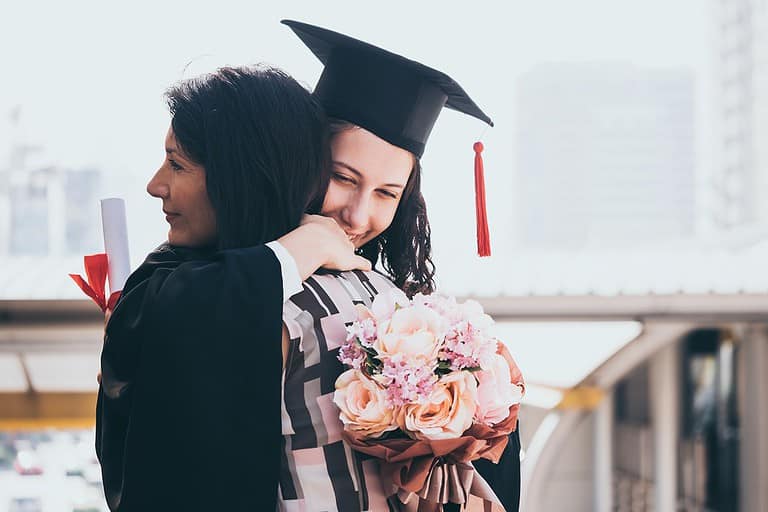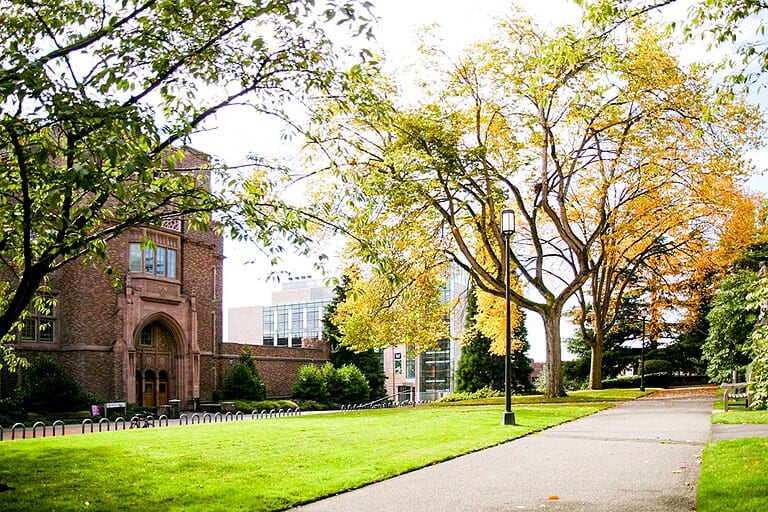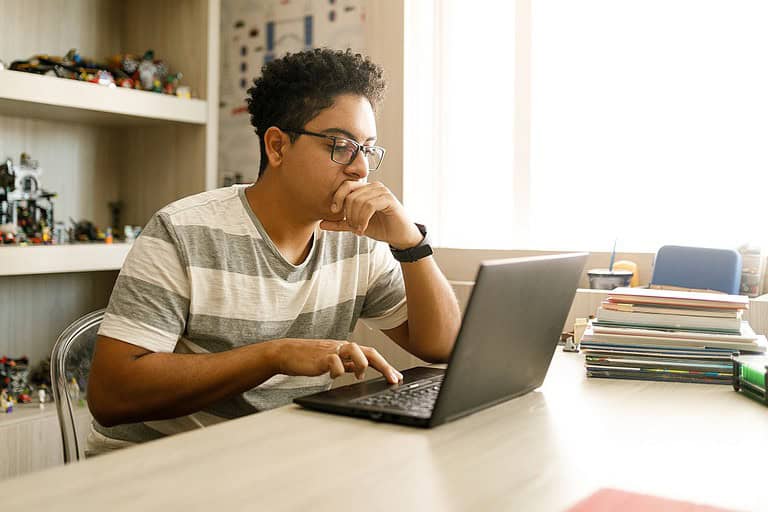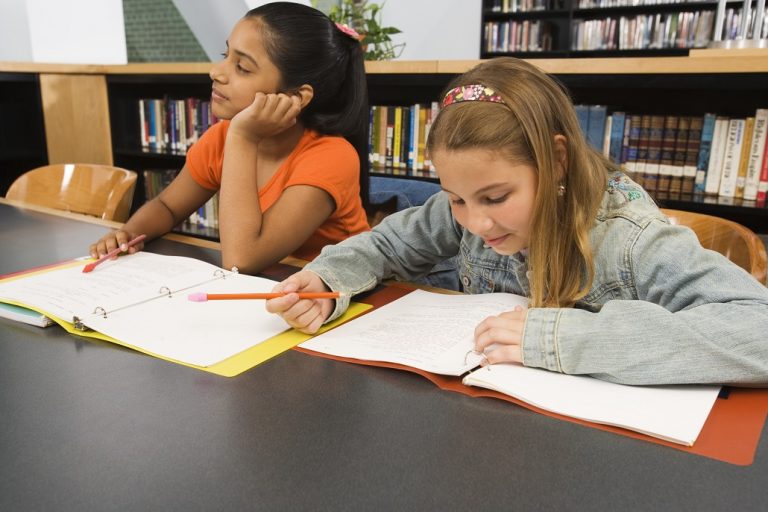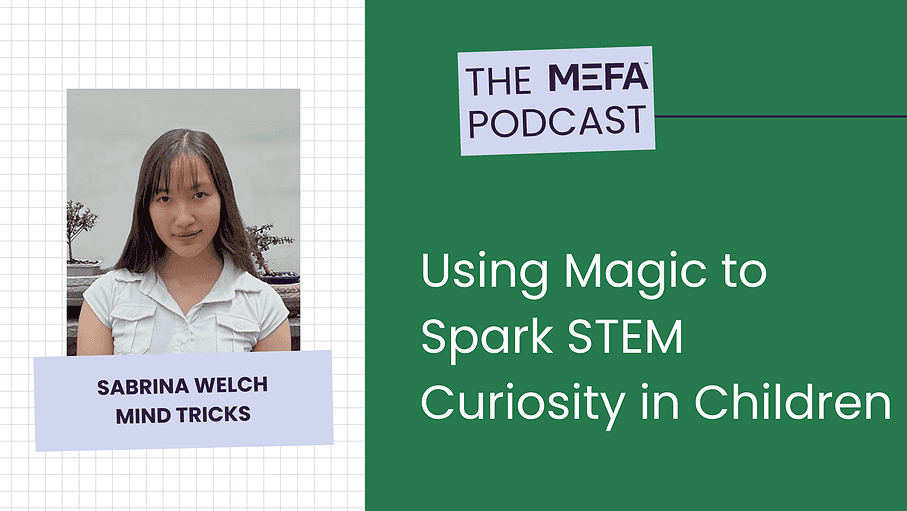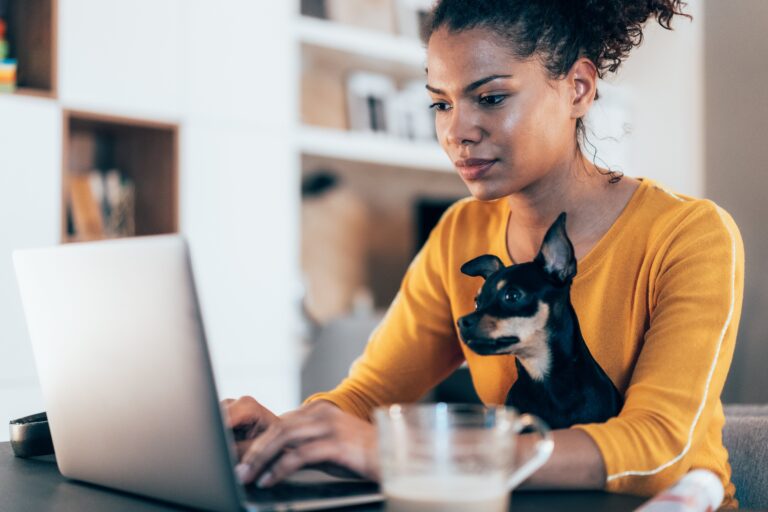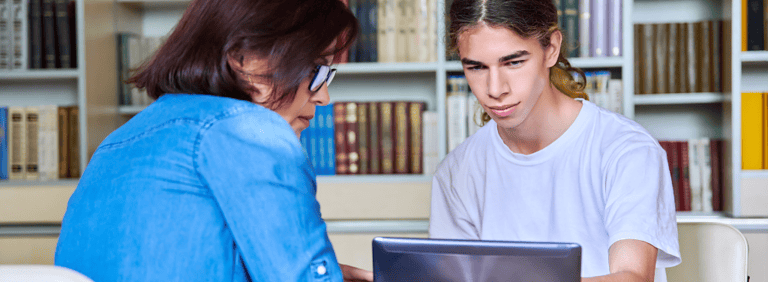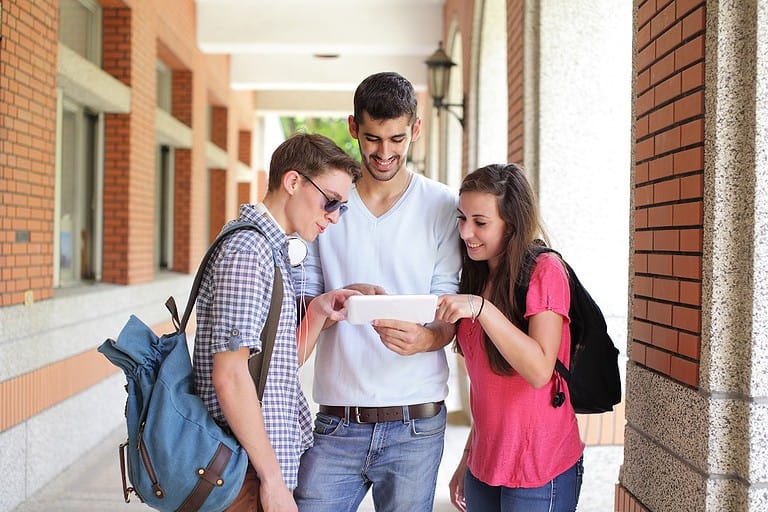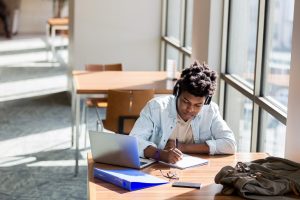Resources Mentioned in this Episode
Sabrina Welch: [00:00:00] Hi, my name is Sabrina Welch and I am a magician. But while I’m a magician, I am also super enthusiastic in neuroscience. So while I perform magic tricks on the street, I also teach neuroscience through these magic tricks.
Jonathan Hughes: Hi everyone, and welcome to the MEFA Podcast. My name is Jonathan Hughes, and that was our guest on the show today, Sabrina Welch. Now, if you heard our last show on STEM Beginnings, you’ll know that we met Barbara Georgia who runs that organization’s STEM Beginnings. Go back and listen to it if you haven’t heard it yet, but that organization teaches.
STEM to kids ages three and up. And when we were talking to Barbara, we found out about a graduate of that program, so to speak, the one that you [00:01:00] just heard, Sabrina. And we heard that not only was she a graduate of that program who got involved in stem, but also created her own organization, her own.
Global organization to teach kids about neuroscience through magic and card tricks and all of this by the age of 17. So if you haven’t figured this out yet, she’s a very impressive person with an amazing outlook and attitude. So you really want to listen to this show or watch this show because this is another show that may work better if you watch it.
You see I recorded some portions of Sabrina’s show. In Harvard Square and that’s what you heard at the beginning and that’s what we’ll cut to sometimes within the show. So if you’re listening to the show and it sounds like we abruptly are somewhere else outside among the people, then we are. I will be back after the conversation to wrap things up, but now I’ll let Sabrina reintroduce herself.
Sabrina Welch: [00:02:00] Hi, my name is Sabrina Welch and I’m 17 years old right now, so a rising senior in high school and I go to she very high. I am a neuroscience magician, so I teach neuroscience to kids through card trick Magic. So in 2023, August, 2023, which was the summer of my freshman year, I founded my youth organization Mind Tricks, the Magic of Neuroscience.
And since then I’ve been able to use my organization as a vessel to hopefully inspire kids. And young children to take on advanced science. What I aim to do mostly is to give advanced neuroscience resources to kids. That includes things like craniotomy, neurosurgery, learning all about the functions of different lobes, temporal occipital, the parietal and the frontal, and then also talk about the brainstem and all three parts of that.
And then also talk a little bit more about something I really like, which is my nation to allow children to understand why they’re able to learn, and why myelination, [00:03:00] which is a neuroscience concept, is so important to their educational journeys.
Jonathan Hughes: All right, so there’s a lot that I want to ask you about in that answer.
So the first one is. How did you get the idea for the card Trick, the Magic Show, the Close Magic Show to teach people about this?
Sabrina Welch: So what I want to do is, if you’ve ever heard the concept before, if learning is fun, you’ll learn better. That is what I really want to capitalize on. So neuroscience is often a pretty inaccessible field to young children.
So what I want to do is find a way to make it easy for kids to understand and make them want to understand the neuroscience. Of what I’m teaching through making it pretty exciting. So when I was thinking about things that I thought could be exciting and fun to learn through, the number one thing that I thought of was magic.
Jonathan Hughes: Okay, everyone, it’s time for a card trick.
Sabrina Welch: But for this trick, what I’ll have you do is I want you to just pick a card in your head. It can be any. Okay. Okay. So do you have a card pick? I do. Okay. What I want [00:04:00] you to do is I want you to take the two cards, which you did not pick, and I want you to swap their locations.
Okay. So I can repeat that again while I close my eyes. Okay. You’re going to close your eyes. Yes. No, I get it. I get it. Okay. So keeping them face up. Yes. So the two cards, which you did not pick and swap their positions, leaving the card that you did pick right where it is. Okay. And then now what I want you to do is, are they successfully switched around?
Yes. Yes. Okay. So now I want you to put each card face down. Okay. All them are facing? Yes. Okay. And can I open my eyes? Sure. Okay, wonderful. So now that I open my eyes just to make sure that there’s no trickery, of course. It’s all magic. I’m just going to keep shuffling and then let me know when you’re satisfied.
Okay. Was your card the king of hearts? Yes, it was. Okay, wonderful. Thank you so much for doing that trick with me.
Jonathan Hughes: Okay, so how did she do that?
Sabrina Welch: The way I was able to do that trick is unfortunately not through magic, but instead through a little bit of card [00:05:00] trickery. So what I was able to do is that when I was laying those three cards down and having you swing them around and things like that, and while I was shuffling, I was paying careful attention to the center card.
So we could technically say that without the center card, this trick would not be able to function. So this trick is regulated by its center card, and the center card is absolutely vital to making the trick work. But what’s super cool actually, is that the same phenomenon actually happens inside our brains.
So the center of our brains called the brainstem regulates all of our vital functions and allows us to function like healthy. Good, normal individuals. So the brainstem consists of three parts, just like there’s three cards in this trick, and that is the midbrain, the pons, and the medulla. And the midbrain is involved in being a relay system for vision and hearing.
So it’s all involved in helping us see, helping us hear the way that we see the. This board right now is actually through our midbrain, helping us out with that. And the way that I’m speaking, and you’re being able to process that is also through the midbrain. And the [00:06:00] pons goes on to handling other unconscious functions like breathing, heartbeat, blood pressure, all of those things, and your medulla.
Lastly, but not least. Also vitally regulates all of your vital processes, such as heartbeat breathing and blood pressure, all of that jazz, along with helping regulate all of those great functions in order to ensure our healthy survival. Because magic is so exciting and is exhilarating and it induces a reaction or it induces something that’s in activation in your brain actually, is that when you’re exposed to magic, it activates your dorsal later prefrontal cortex, which is pretty cool because.
That is going to elicit a higher reaction in your dorsal later prefrontal cortex than just simply more surprising events. If you were to get a plus on your test, if you didn’t maybe study for it and you’re like, oh, I got an A Plus. But it’s more surprising to see magic. So what I really wanted was to get a wow factor mechanism to capitalize on in order to have something.
Very exciting for kids to pair with education, so [00:07:00] then they’ll be hooked into the education and then ultimately learn things better. A magic trick is really what brings everyone’s curiosity out. And so with that, while bringing out their curiosity for magic, I want to bring out their curiosity for neuroscience.
Jonathan Hughes: Why neuroscience? How did you get involved in neuroscience specifically?
Sabrina Welch: So neuroscience has definitely been something that has been on my radar since kindergarten, but actually. Yeah, it was actually a mistake, but when I was little I really actually wanted to cure cancer and I really thought that was really cool.
I always got a bunch of like medical books from my local library and I actually got in trouble because I kept on taking out the same book over and over that was about human body systems in my kindergarten library and they’re like, this is the third week that you borrowed that book. To borrow a different book because they like, of course, want to expand your vocabulary past just a single book during that developmental stage.
But when I was into all these human body systems and reading up on that, I found an app on my [00:08:00] app store. When I was on my iPad as a kid, and it was about, it was a brain model where you could go into, look into the four lobes. You could also look into more specific parts of just one lobe and you could look at the brainstem and then different parts of the brain, which was really cool.
And so I remember, I. I just thought it was so interesting and it was the first time I really ever got my hands on something that was very specific and in depth. And that’s what I really wanted to do as a kid, is to really look into something really closely. And that’s what that app allowed me to do.
And it happened to be the brain, but from there I was able to look more into the brain. because I was like, wow, this is super cool. Like I want to learn more about it. I truly just fell in love with the field. It’s so interesting how your brain really is what makes you view your personality and the ways that you’re able to develop and just the way that you are.
The way that we’re able to learn about anything is through our brain. Our brain is helping us learn about itself, and I think that’s cool because you can’t say that about any other organ. And also the last thing that really. Fired me to really take on neuroscience was my love for connection. [00:09:00] So I always loved people from such a young age.
It’s really cool to just be immersed in any environment, even if you’re not speaking to them or if you’re not knowing them personally. But I always really liked seeing how different people react and different people are. There’s so many cool personalities that are out there and I think it’s just so cool how everyone has their own life going for them, and they all have their own challenges and their own ways that their brain has developed due to their circumstances or due to their genetics or something like that.
Your brain is what connects us all is that we all have a brain, but it all developed differently. So I feel like that is really cool too, is that I wanted to explore that further and see how we can have the same organ, but be so drastically different from another and how that can lead to so many diverse personalities to explore.
Jonathan Hughes: So you came to our attention through Barbara Jorda who we did our last show about who. Runs a STEM program for kids as young as three, I think up to grade six. And you came from that program. Was that part of, why? Because [00:10:00] you’re saying, I really wanted to show kids and to, about neuroscience and that stuff.
And I was thinking but why did you want to show kids about neuro show kids this, about neuroscience and help them to learn? Why do you think that? Do you think that was part of it? What else do you think was part of that?
Sabrina Welch: Yeah, absolutely. I definitely think that program was absolutely helping me and develop me, my want to teach STEM to students because that was really my first exposure as a kid to an interactive program that was meant for kids.
That was like a long duration and also taught a lot of in depth STEM processes. And what was really cool about her program is that it actually touched every year. Type of, I’m not sure every word of the stem, oh my gosh, I forgot the word for it. Acronym. Acronym. Acronym. There you go. Yes.
It was really cool was that her program went into science, technology, engineering, and math. And later on she’d add art too. So every single time we go into a workshop, she’d touch on a different part of that STEM acronym or STEAM acronym. And I think that was very important into showing kids that there’s so [00:11:00] much that you can explore in the STEM world that isn’t just your typical science.
And I think that what I want to do is show kids as well, just like she is doing a wonderful job in. Inspiring so many kids with is that I also want to continue on with that mission and showing that the science world is so fast and it’s not just what we learned in our science classrooms, but there’s so much to explore beyond that.
It also wasn’t really great, is that had a lot of integrated and hands-on programs and I think that was very important to. Giving a very hands-on approach to learning. And I think that does help a lot with helping kids remember their education as well. And you actually see that in neuroscience as well, is that you’ll be able to remember concepts that you learn more through myelination, is that if you had a reward pathway and repetition and also usually hands-on learning is more of rewarding because it’s more fun usually, or it’s something that is allowing you to repeat something within action.
I think also what inspired me too is that I know how much I’ve benefited from so many. STEM events and STEM programs that I’ve attended as a kid, and I really want to put that into my community [00:12:00] again, especially after COVID. I saw that there’s a very steep decrease in the amount of free STEM events that are available for kids.
Jonathan Hughes: So tell me what it was like setting up your program and what was it like, what was involved in that and what was it like going out? Yeah, in public for the first time.
Sabrina Welch: So setting up my project was definitely a lot of fun, but it was also scary. I personally have a little bit of social anxiety, so I’m a little bit like nervous sometimes.
Not anymore, which is such a great thing that’s been able to help me personally develop as a person through doing this program. Do you want to see a magic trick? Okay. Street performing has definitely taught me a lot about like accepting rejection too. I would say. Definitely take some getting used to, but I want to do it because I have a little bit of social anxiety.
So I want to combat that and ultimately try to put myself out there on blast, especially. It’s great that Boston is such a big place, then it’s not too awkward if it goes unwell. [00:13:00] Yeah. Hi. Would you like to see a magic trick? But when I was first starting, I was really nervous to get in front of an audience, especially because it was one of my first times really doing a show for more than seven people.
I do speech and debate, so usually if I do public speaking, it’s only in front of seven people. And usually you know them pretty well. But this is the first time I was like, oh my gosh, these are all strangers. They’re all little kids. And I was like, and I want to make them feel something about science.
So that was really important to me, where it feels more of a duty to do well because you want to. Make them leave with something that’s important to them. So I think that in the beginning it was definitely a little bit nerve wracking with public speaking, but as I’ve been able to continue on, it’s definitely become something that I love so much.
So I would say setting up, I remember I emailed. Around 50 libraries to ask if they wanted this program. It was actually all hypothetical. I did not finish my program at that time. I was just like, you know what, I’m going to cold email everyone and see if anyone’s interested. And then I’ll work on my project while I get responses back.
And what grade were you in at this point? [00:14:00] I think I was a freshman, but I was going into my sophomore year. Okay. Yeah. And I made the show idea in eighth grade though. So then after I cold emailed around 50 libraries, since it was a very new idea, I think that I’d only got five responses back and only one person said that they would book a show and that was the Newton Library.
So very thankful to them. But so for my first show, I actually got a trick wrong, which is kind of interest.
Jonathan Hughes: Oh, I was going to ask you how you deal with that if you were worried about getting a trick wrong.
Sabrina Welch: It was really funny because I didn’t just get it wrong. The kid came up and was like, eh, that’s not my card.
And then he went straight to the audience and was like, look card. And I was like, oh, if I were to get that right then this is the no science. I’ve got a lot better from there as well. But yeah, so I’ve definitely been able to learn as I’ve been able to continue to. Make my program better, I would say through more practice is that I’ve been able to learn how to [00:15:00] ad-lib off of that as we’ve been able to continue to expand.
It’s gotten a lot easier with cold emailing, and I’ve been so blessed to be able to have people reach out to me instead through having our program that get bigger. And I think what really initiated that first spark to really pull people’s attention to our program was the MIT Cambridge Science Fest. So I remember initially I asked the Cambridge Library if I could hold a show just at their libraries, and then I gave her a little demo of the show and she was like, Hey, you know what we should do?
We should really put this in the MIT Cambridge Science Festival. And I was like, oh my gosh. MIT and I was like, that’s so cool. So I was super enthusiastic about that. And I used to go to MIT for little programs that they would hold. I went to a coding program. Sometimes they had outdoor programs. And also I always look up to that school.
So I was like, that’d be pretty cool. And from that we actually got our first person ever to reach out to us instead of us called emailing to them. And they asked us for a show at the Boston International School. And things have really just. Skyrocketed from there.
Jonathan Hughes: Yeah. Tell me about when you say the program got bigger and it grew, tell folks what you [00:16:00] mean by that.
Sabrina Welch: Yeah, of course. When it first began to get bigger, we were able to get a lot of people reach out to us about having shows and also we got a lot of more responses back to us also on social media. We really blew up and I think that was through a lot of planning and marketing and. Strategic decision making on how to manage our social media.
That really got the word out. And after we’ve been able to hold more shows, I was able to realize at that point I was only doing it by myself. So I was like, I think I really want to implement a team and get this opportunity out to not just little kids, to learn neuroscience, but also teenagers to engage in stem.
So from there I decided to make a team, and that was initially just six of my friends. I asked them, but now it’s really cool because we get tons of. Leadership applications that people apply to that I’m not familiar with yet. So it’s really cool to be able to connect with more people through that. Also, we have a chapter system now, that is expanding our program internationally into the world, into [00:17:00] different countries and different states in America and different provinces in Canada, since we have a couple of Canadian chapters as well. The reason why I was able to begin chapters was actually through a very motivated and passionate student in Hong Kong.
Her name was Avril Li. She had such a heartfelt. Message that she emailed me, which was so inspiring, is that she said that within her community she saw that there really was a lack of opportunity to extracurricular resources and for kids to engage in STEM outside of classroom. And she wanted to bring that into her community.
And I was like, wow, I absolutely want to do that. Too, as we went over it, I was like, let’s open a chapter in Hong Kong so then you can do these magic shows in your community as well. So that really set off with her beginning her Hong Kong chapter. And with that, with our social media presence growing as well, that was able to skyrocket once I made a chapter program that people can apply to.
After that, the way that we were able to. Band after Avril was through social media. We did a lot of webinar collaboration with other youth [00:18:00] organizations and that was able to help us reach an international audience. And at the end of our webinars that mostly talked about neuroscience or talked about how to start a youth organization or how to do research in high school, I’d be like, Hey guys, if you want a.
Neuroscience opportunity, then you can always apply to Matrix and we’d love to have you. And from there we’ve been able to expand to, I believe Hong Kong, Michigan, Minnesota, California, Canada. We just opened one in Morocco, north Africa, which is so cool. She is motivated China, Bangladesh, and India. And we also have one in Turkey, which is really cool.
She’s doing a great job.
Jonathan Hughes: Are these mostly, women or young women or girls who are doing this because you keep saying she, I noticed.
Sabrina Welch: I think that’s a good mixture. A lot of them are girls, which is really inspiring and it’s so cool to see fellow girls in STEM initiate something so impactful in their region.
Jonathan Hughes: Right now we’re going to talk about your plans and what I have some idea of what you may want to do, but we’re talking. But when you go to college and when you do this, what happens to mind? Tricks.
Sabrina Welch: I’m just going to continue. I love this program and. [00:19:00] It’s something that I want to continue for as long as possible, especially for having brought it to all over the world.
I see so many people that email me or send in their chapter applications or people that apply their leadership team, and it’s always so inspiring to see how much they’ve been able to see from mind tricks and how they’ve been inspired to initiate something in their own community.
Jonathan Hughes: As if you don’t have enough going on, let’s talk about your plans for college, you’re a rising senior. That’s what we do here at MEFA. So I thought, who better to talk to? We always like talking to students. What have you been doing to prepare now? The, I’ll tell you where I think most kids or most students are at this point, right? Your and your summer, between your junior and senior year, visiting colleges, maybe compiling your list preparing looking for scholarships.
Sabrina Welch: I think you really hit it nail on the head of what I’ve been doing so far. I’ve also been having my essay in the works lately. Oh yes. I think what I’ve been really prioritizing is visiting colleges and trying to see their [00:20:00] campus as, I think something for me personally is that I work better if I like the environment around me.
So the campus is definitely something that’s pretty important to me. So right now I tour. Columbia. And then I also toured Georgetown, and then I technically toured Harvard, but I also work in intern for a lab at Harvard University since my freshman year. So I’m pretty familiar with their campuses by now.
I definitely say I love their campus a lot, especially it feels a lot like home from also having, I feel like they’re almost like a second family to me. Is that the chai laboratory? Is that they’re, it feels very comfortable. It almost feels like I have a home away from home there where Yeah.
Have like my science family, but yeah, so I would say that I’m pretty familiar with their campuses by now. So I haven’t toured recently, but I did tour when I was a little bit younger. But yeah, so that’s been pretty exciting. I really like the Columbia campus. Of course, I love the Harvard campus. It’s very beautiful and also it feels something very familiar, which I like as well.
And I also like the, I [00:21:00] like the things that they’re doing there. And then for Georgetown I liked it as well, especially with my engagement in politics recently. A couple other places that I’m hoping to tour is I really would like to tour Stanford, but that’s a little bit far away from us on the East coast, so I might have to do a digital tour or something like that.
But yeah, there’s a lot of colleges that I’m looking at that I would absolutely love to go to. And I think like any college that is able to take me in and I’m able to further my education and I’d be so grateful to have the opportunity. But yeah, there’s been a couple that is on my radar for sure, but I think I definitely want to focus as well on my application too.
So right now I’m preparing for August SAT to yeah, to hopefully get that score the way that I would like it to be. And then I’m also preparing my essays right now. I’m thinking about a couple options. One of them is of course about mind tricks. I feel like that probably is the thing that is really represents me most as character.
Jonathan Hughes: When I mentioned Harvard Square and we did the recording you were there with your mom [00:22:00] and with your grandmother.
Sabrina Welch: Yeah.
Jonathan Hughes: I was just curious if you know your mom if she played a role in your interest in. Neuroscience and science in general and.
Sabrina Welch: I would definitely say that she played a huge role in both my mom and my dad. They definitely played such a large role in my academic journey, especially with moving into science. I would say that maybe not in the traditional sense, where my mom, she used to do insurance and my dad’s truck driver, so most of my family, they’re not involved in science at all. But what I will say is that they’re very active parents and.
They come from more of a low income background, so one thing that they really want for their kids, and they always tell us, which I’m so grateful for the opportunity and all of the hard work that they have done to ensure that we have the opportunity to take on education in a way where we don’t have to worry more so in a way where it’s more about finances than about pursuing our education. And for that, I’ll be forever thankful for both my mom’s and my dad’s contributions with my mom. She [00:23:00] was very active as a kid and I think it was also helpful that I was really interested. In everything that she signed me up for.
So she would go on Eventbrite to find a bunch of free events in STEM and she would bring me to all of them. It always felt like after school there’s always something else to go to that’s STEM based. Mostly because she knew how much I loved it, and that was something that she really nurtured as a parent is that she would ask people for age exceptions or she would be like, can I bring my kid here?
Or she would always be about that is that no matter what, she would always be willing to go the extra mile to get an opportunity for her child, which I think is so admirable as a mother, and definitely something I’m so grateful for is that really, like she always, whenever she saw something that she’d think I’d be interested in, regardless of what age category it was meant for, she would always make sure that.
She would ask them if like I would be able to come. And I think that was something that helped me a lot too, is working with older people when I was younger is that it shows you a lot of repertoire too and also a lot of character. And I think that has been really helpful in developing my [00:24:00] own personality is to see all these role models in science and see how I want to portray myself as well.
And I think that’s helped me as a character and also in science is you definitely learn a lot. From people that are older than you. And my dad actually, when I was younger, he would take us to, before kindergarten, since it like started at nine o’clock we’d have, we would walk to school. We would have an hour to go to this cafe.
My dad would always order a pistachio muffin and then I get to order a blueberry muffin and then we’d sit down for an hour and then he’d teach me different stem things or he’d teach me about everything. Actually, he’d teach me about science. He’d teach me about math since I was a little kid. He taught me the alphabet and then he also taught me about different things like politics in the stock market.
And he also taught me about like love and what. Family principles are important, and I think what really showed me from that experience is that my dad never took my age as a limitation where he saw that even though I’m a kid, he never limited the information that he was giving me, or he really just acted as if my potential was [00:25:00] limitless. And I think that is something that I want to perpetuate too, is show that children are so capable and they can do anything and learn anything as long it’s made in a way. That was fun.
Jonathan Hughes: Last question. What have you learned is, anything you want to say from your time doing this show what you’ve learned or any advice or any sort of final thought to leave folks with?
Sabrina Welch: I would say from my time doing Mind Tricks, I’ve definitely learned a lot about science actually, personally I’ve learned from doing that. I’ve been able to learn a lot more about neuroscience since. Of course, if you’re teaching something, you have to be pretty proficient in it. And I also think, say that I learned a lot about how to make information exciting.
I’ve also learned, I think this is my biggest lesson and also the most beautiful thing that I’ve learned from mind tricks, is that children really are capable of everything. I think I said that before, but really that is, I think that would be incomplete to answer this question without addressing that, is that kids have the potential to learn anything.
And I think that sometimes education thinks that kids have to learn at a certain pace where. [00:26:00] They are not able to explore a more advanced content because they’re doubted that they can learn that well. But I truly, genuinely think if they are sat down and they’re taught in a way that is engaging to them and also in a way that makes that information exciting and interesting, and also in a way where they’re genuinely paid attention to, then they’ll be able to learn that concept.
Kids have the potential to do so much, and if they are nurtured in the correct way, they’ll be able to do it. I wrote a research paper actually on my show that was about how my nation is able to play a really big role in education and how my show uses that as a strategy to teach children and it really addresses how much that hands-on learning should be more integrated into the school system.
So first, free performing, usually since I go to Harvard Square, since that’s where my permit allows for, and I also go to Nearby Street, I’ve been able to learn so many things from different adults that stop by for a trick or different students they talk about why they got in stem or they just talk about their upbringing, their life in general. And I think that [00:27:00] also taught me a lot, especially from moving on from my kind of a little bit introverted-ness and social anxiety is that there’s so many cool people to connect with and you just have to take that step. Hi, would you like to see a magic trick?
Yeah. Okay. Wonderful. But yeah, what’s your name? Nice to meet you. I’m Sabrina. My number one message for people is to find your passions and share them with your community because it’s so beautiful. Once you’re able to create something that is so resonant with your character, that you’re also able to share and empower other people in your community with.
Jonathan Hughes: And if any library or any organization is listening and they want to get in touch with mind tricks, how do they do that?
Sabrina Welch: Cool. Absolutely. You can go to our website. It’ll be, you can just look up Mind Tricks, neuroscience, and then if it doesn’t pop up it, you can just put Wix after it and it should pop up. But that is our website. You can find our email there, which is, I think Mind Tricks [email protected] and then also. But if you want to see more about our program, you definitely can see a lot more pictures on our Instagram, so that will be at mind. Mind dot Tricks [00:28:00] underscore official. And if you want to look at our other chapters and what they’re doing, you can look up at mind tricks and then underscore, and then you’ll see like all of our chapters that you can click through if you’d like to. And we also have a chapters highlight that you can click through as well.
Jonathan Hughes: I can’t tell you how much I’ve enjoyed talking to you and best of luck to you and everything.
Sabrina Welch: Thank you so much. Thank you so much for having me too. It’s been a pleasure.
Jonathan Hughes: All right. Didn’t I tell you? Didn’t I tell you that was a good show? I would like to thank Sabrina Welch for joining us and also allowing me to record her show. We will post the info for mind tricks, by the way, in the show notes, in case you want to get in touch. And if you liked what you heard on the show today, or what you saw on the show today and you want to know more from us on planning, saving, and paying for college and career readiness, then you can then you can follow the show and you can do that wherever you [00:29:00] get your podcast.
Oh, please remember to leave a review so we can better know what you want to hear from us or see from us in the future. I would also like to thank Shaun Connolly, our producer, as well as Lauren Danz, Lisa Rooney, Meredith Clement and Christina Davidson, and AJ Yee. For their assistance in getting the show posted so that you can listen or watch it.
Once again, this is Jonathan Hughes and this has been the MEFA Podcast. Thanks.


